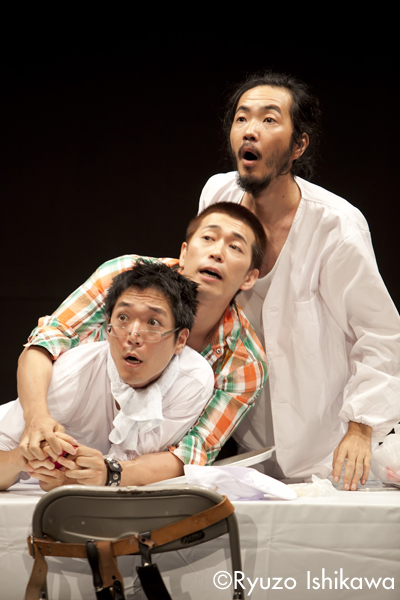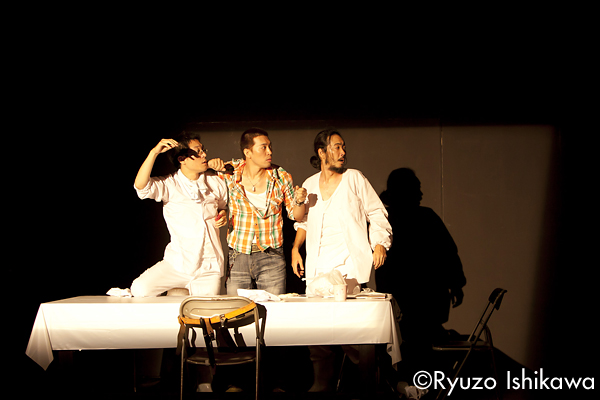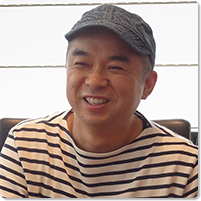The setting is a room with grinders used for sharpening butcher knives in a meat-processing factory on the outskirts of Tokyo. The room also serves as a rest area for the factory workers and has a long table with an intercom telephone on it.
It is a winter afternoon and two of the workers who have been on the job since early morning are starting a late lunch. Their meal is inexpensive boxed lunches bought at the local convenience store. The two are specialists with the skills to dress down an entire animal by hand and they are assigned to the butchering of high-class “brand” beef or pork or animals that can’t be put on the automated conveyor line due to disease or other reasons.
One of them is a veteran butcher from Osaka named Genda who is in his 50s. The other is a man in his early 30s named Sawamura, who has a child of elementary school age. The recession has caused layoffs that have increased their workload and they are worried about their own futures.
The telephone rings. Some medullas that are supposed to be sent for BSE tests are missing from cattle butchering room.
If the tests can’t be performed the beef can’t be shipped out and the company will suffer a revenue loss. They are told that as a result the production line has been stopped and all the employees are searching for the medullas. The two are ordered to join the search when their break is over.
As the two complain about the extra chores they have had to take on because of the company’s heedless staff cutting, an unfamiliar young man knocks at the door of the room where they take their break. He is a frank-looking young man of about 30 who introduces himself as Ibu. He appears to be a new employee who has just had a tour of the conveyor fitted butchering room. Genda leaves Sawamura in charge of the young man and leaves the room to join the search for the medullas.
Now Sawamura and Ibu are alone in the room. As Sawamura is explaining all the things Ibu doesn’t know about the butchering room, like the necessity of BSE tests, he is imagining that Ibu is just a spoiled “NEET” bachelor still living off his parents despite his age.
Ibu comments that he wants to work in management because the physical labor of the butchering work looks too hard. Sawamura starts lecturing Ibu about his attitude and the irresponsible way he is living. He shows Ibu pictures of the wife and child he is already working to support, even though he and Ibu are the same age.
Sawamura doesn’t realize that Ibu is the son next in line to inherit the Ibu Kuro Buta (Ibu black pig pork) pig producer, a well-known pig brand and one of the butchering company’s big clients. Today, he has come to the factory with his father, the Ibu Kuro Buta president, for whom he is driving. When Sawamura realizes this, his behavior quickly changes and he begins trying to appease Ibu and get on his good side.
Here, Genda returns with some kind of bag in his hands. He appears surprised to see Ibu still in the grinding room as he hurriedly puts the bag in a locker.
Genda tells Sawamura to go join the search and suggests to Ibu that it is time for him to leave the room. But, Ibu says he is going to wait here until his father finishes his business talk.
Alone together now in the room Genda and Ibu talk about butchering brand pork, but soon the conversation moves on to subjects like the job of the butcher and about the meaning of a “life” and it reveals difference in their outlooks.
Sawamura suddenly returns to the room breathless. Now, the elderly employee Yanagi who had been working at severing the heads of cattle where the medulla is located has apparently disappeared with the slaughtering gun. Everyone is suspicious that Yanagi has been hiding the medullas.
In fact, had met Yanagi on his way to the slaughter room. Yanagi had been acting suspiciously and had asked Genda to take care of the bag of medullas he was carrying. Genda had misplaced the bag for a while and was now trying to return it where it should be. At the same time he is worried about Yanagi, who in his panic has disappeared with the slaughter gun.
As a bystander, Ibu can’t help but chuckle at this comedy of errors and hints that this company might not be worth of trusting their brand pigs to and maybe they should end their business with it.
Sawamura pleads tearfully that if their company loses the Ibu account they might go bankrupt, but that doesn’t change Ibu’s unconcerned attitude. He even suggests that Yanagi disappeared with the gun with the intention of threatening the factory manager for money. That attitude infuriates Genda. He takes Ibu and wrestles him up against the grinding machine and forces medulla to his mouth. Sawamura tries to remain neutral but is torn by the pressure from both Ibu and Genda. In desperation, he picks up a butcher’s knife and points it at the two of them in an inexplicable act. Ibu tries to call for help from outside the grinding room.
Through the skylight window we see Yanagi on the roof, walking with the slaughter gun in his hand.
Hearing the commotion within, employees knock at the grinding room door. Startled by the sound, the three inside rush to hide the medullas. As soon as the door opens we hear the sound of the slaughter gun going off.
The stage goes dark.
It is an afternoon in the grinding room a week later. Sawamura is alone having a late lunch. Genda comes in wearing a suit, having just come from a meeting with the factory manager. He says that he was able to avoid being fired, but he has been demoted and moved to the production line. It appears that the shot Yanagi fired with the slaughter gun was aimed at the sky and no one was injured.
Genda has been ordered by the manager to be in charge of outside training today.
Ibu appears in front of the two wearing a white work coat and saying that he has come to experience working in the factory. In an abusive tone, Genda says, “Who would teach the likes of you.” Then he heads off for the butchering room.
As soon as he is alone with Sawamura, Ibu makes a comment intent on washing away any ill feelings about the events of the week before. Sawamura can only stare at Ibu’s innocent expression.
Tomorrow the work in the butchering industry will go on as always.




